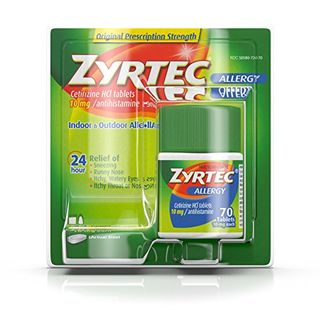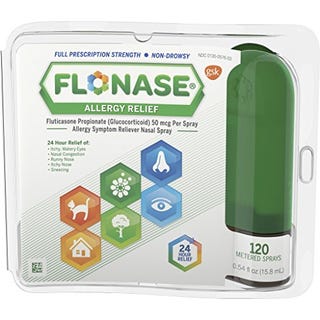How to Get Rid of a Runny Nose Instantly
If you're sick, you know what it's like to buy out the entire supply of Kleenex at your local drugstore. A nasty cold isn't the only thing that causes drippy nostrils, though. Pretty much anything that irritates the sinus cavity or the nerves of your nose—infection, allergies, and even the food you eat—can make your nose super runny.
"In normal situations, the sinonasal mucosa (the lining of your nasal and sinus cavities) can produce up to a quart of mucus per day," says Ahmad R. Sedaghat, MD, PhD, an otolaryngologist at Massachusetts Eye and Ear Infirmary in Boston. "This mucus normally flows to the back of the nose, down the throat and then is swallowed."
In short, you don't notice it. But sometimes, you become a mucus-producing machine. And if you do, it's important to figure out what's causing the leak, because different causes have different treatments. While there are surgeries for vasomotor rhinitis (chronic runny nose), there are steps you can take to reduce the flow on your own in most cases. Here, seven common reasons your nose won't stop running—and how to turn the faucet off.
The common cold
When a virus like the common cold enters your nose, it attaches to cell molecules and spurs a release of chemicals called cytokines, which cause inflammation, explains Erich Voigt, MD, an otolaryngologist at NYU Langone Health.
"The human body utilizes the process of inflammation to fight off the virus, however, the effects of the inflammation include a runny nose." With a cold, mucus is usually clear and watery, Dr. Voigt notes. Other symptoms include sneezing, coughing, a sore throat, watery eyes, and mild body aches.
Runny nose remedy: Unfortunately there's no cure for the common cold, so your best bet is rest, hydration, and over-the-counter cold medicines with an antihistamine—a medication that works to stop a chemical called histamine that can cause a runny nose—and a decongestant, says Dr. Voigt. Sudafed and Actifed both fit the bill.
Sinus infections
If you have a fever, can't-get-out-of-bed tiredness, a cough, congestion, or a thicker, yellow/green discharge running from your nose, your "cold" might actually be a sinus infection, which can crop up when bacteria cause irritation, infection, and discharge, says Anthony G. Del Signore, MD, an otolaryngologist at Mount Sinai Beth Israel in New York. With a sinus infection, you could also notice post-nasal drip, when mucus drains to the back of your throat.

NeilMed Sinus Rinse All Natural Relief Premixed Packets
Runny nose remedy: Since sinus infections can be bacterial, you might need an antibiotic. OTC decongestants can also help, and many docs also recommend salt water rinses, which can clear the nasal cavity, says Dr. Sedaghat.
To make a saline mixture, mix ½ teaspoon non-iodized salt and ½ teaspoon baking soda into one cup of distilled or sterile water, says Dr. Sedaghat. This concentration matches the concentration of salt in the body, he notes. There are also also many pre-made saline packets you can pick up at your local drugstore or Amazon.
To do a rinse, fill a neti pot, lean over the sink, put the tip of the nozzle into your nostril and gently squeeze, going back and forth until the mixture is used up. "The saline may come out the same nostril, it may come out of the other nostril, or it may come out of the mouth," says Dr. Sedaghat. Do this once or twice a day.
Allergies
Your nose can also become runny if it's exposed to an irritant. "Typically, an acute exposure to an allergen will make the nose itchy, swollen inside, will trigger a lot of sneezing, and clear watery mucous production," says Dr. Voigt. Allergies cause the chemical histamine to be released, which directly causes said symptoms.
Runny nose remedy: Antihistamines (like Zyrtec or Claritin) are your friend here, as they work to stop the histamine response in the first place. Nasal steroid sprays (like Flonase or Nasacort) can also help decrease inflammation in the nasal cavity and, thus, liquid production, says Dr. Voigt.
If your allergies are caused by pollen, try to avoid it by checking pollen counts. But don't overlook indoor allergies: Vacuuming your carpet frequently (carpets can fill with dust mites and mold), and using dust mite covers on your bed can help keep symptoms at bay, says Purvi Parikh, MD, an allergist and immunologist at the Allergy & Asthma Network. Keeping your pet out of your bedroom can also limit exposure to allergens.
If you've been leaking for more than a week and notice your goop is starting to get thicker or looks yellow or green, make an appointment. Allergies can sometimes morph into sinus infections, Dr. Voigt notes.

Zyrtec Prescription-Strength Allergy Medicine Tablets
amazon.com

Claritin 24-Hour Non-Drowsy Allergy Medicine Tablets
amazon.com

Flonase Allergy Relief Nasal Spray
amazon.com

Nasacort Multi-Symptom Nasal Allergy Relief Spray
amazon.com
Spicy foods

Maximilian Stock Ltd. Getty Images
Sometimes, your nose runs because of nerve stimulation. "Certain types of nerves in the sinonasal cavities can stimulate the production of more mucus," says Dr. Sedaghat. And some of those nerves can be activated by spicy foods, he notes.
Capsaicin, in particular—the chemical in hot peppers—causes rhinorrhea (an excess of fluid in your nasal cavity) and sweating. "It's likely a response to try to get the irritant out of the body," says Dr. Voigt.
Runny nose remedy: A prescription spray called Atrovent can work to 'turn off' the nerves that fire up from spicy foods as well as strong odors, reducing excessive mucus production, says Dr. Sedaghat. But if spicy foods really bother your nose, it's best to just skip 'em.
Crying heavily
Ever notice that you're a slobbery mess after a breakdown? "Crying will cause a runny nose because tears drain into the nose through tear ducts," says Dr. Voigt.
Stop a runny nose: It's pretty normal to become a running faucet after you cry. "Sniffing and blowing the nose will clear out the tears and excess mucus, so keep some tissues around," Dr. Voigt adds. (While you're at it, treat yourself to a relaxing bubble bath and a piece of your favorite chocolate—the little things can help pick up your mood after a long day!)
Nasal polyps
Nasal polyps are soft yellow growths that can grow in your nose and sinuses. They have a jelly-like consistency, are made up of inflammatory cells, and can lead to a chronic runny nose, explains Dr. Voigt. If you have them, you might notice a decreased sense of smell, facial pressure, or even difficulty breathing sometimes (if the polyps grow). Docs aren't quite sure what causes them, but they appear to be associated with allergies and infections.
Runny nose remedy: See your doctor. Small, benign polyps can sometimes be treated with medications, such as steroids. But if they continue to grow or obstruct your breathing or sense of smell, there are surgeries that can be done to remove the polyps.
Exercising in the cold

Georgijevic Getty Images
"Exercise temporarily increases mucus in your nose and lungs as there is increased inflammation and blood flow to these areas," says Dr. Parikh. Exercise in lower temps and you'll get a double whammy: Cold, dry air is particularly irritating to the sinuses and lungs, which prefer warm, moist air, research shows.
Runny nose remedy: Drippy nostrils from a chilly outdoor run usually resolves on their own. Exercising with a scarf or neck guard over your nose can help warm up the air before you breathe it in, too, says Dr. Parikh. If you're really stuffed up—from a run or just from time spent outside—inhaling the steam during a hot shower can help open your nasal passages, he says.
Cassie Shortsleeve Freelance Writer Cassie Shortsleeve is a skilled freelance writer and editor with almost a decade of experience reporting on all things health, fitness, and travel.
This content is created and maintained by a third party, and imported onto this page to help users provide their email addresses. You may be able to find more information about this and similar content at piano.io
How to Get Rid of a Runny Nose Instantly
Source: https://www.prevention.com/health/a22776525/how-to-stop-runny-nose/